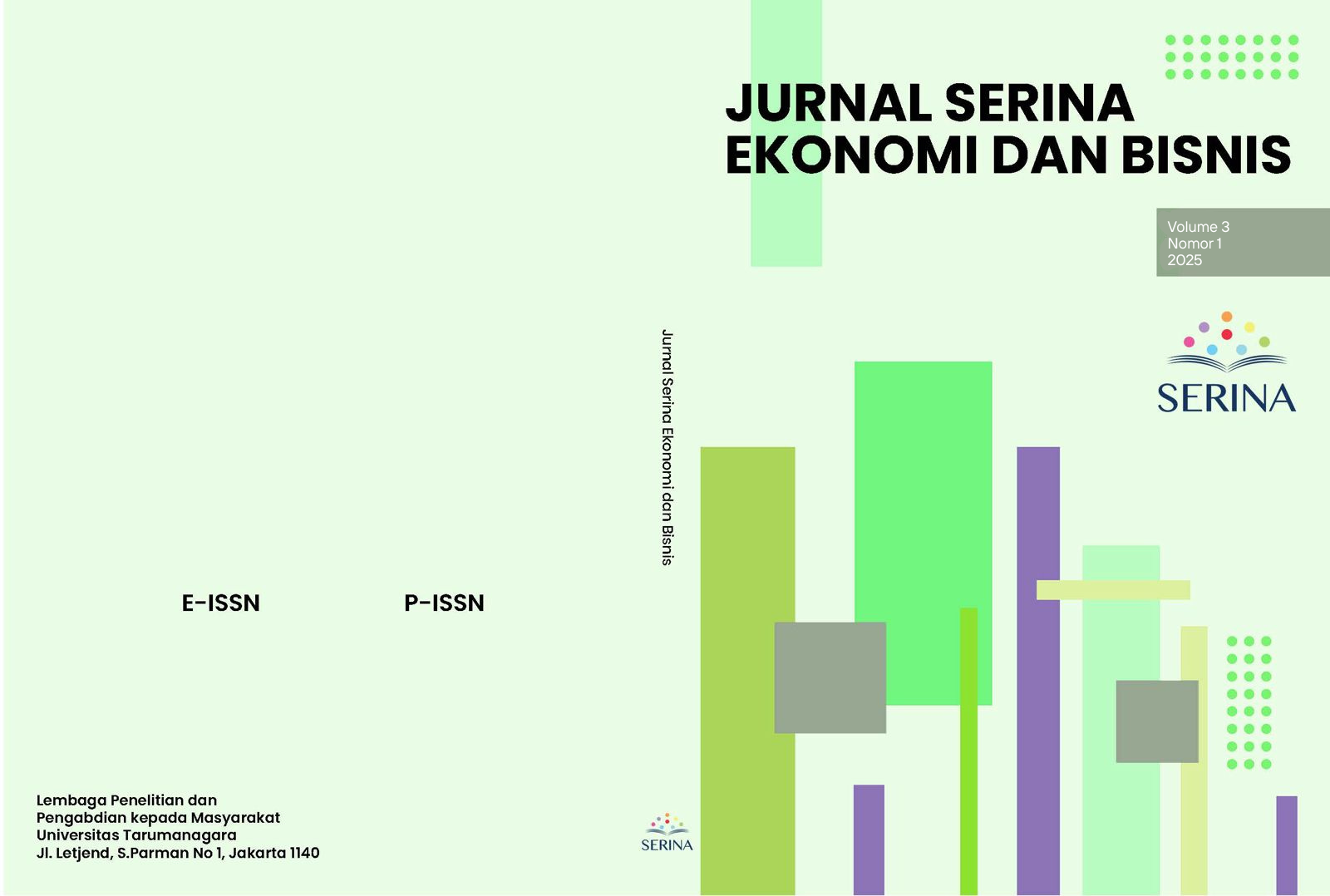PENGARUH LITERASI, LIKUIDITAS DAN INKLUSI KEUANGAN TERHADAP KINERJA UMKM DENGAN DUKUNGAN PEMERINTAH SEBAGAI MEDIASI
Main Article Content
Abstract
Penelitian ini bertujuan untuk menganalisis pengaruh literasi keuangan, likuiditas keuangan, dan inklusi keuangan terhadap kinerja UMKM, dengan dukungan pemerintah sebagai variabel mediasi. Penelitian ini menggunakan pendekatan kuantitatif dengan pengumpulan data dari 264 responden yang merupakan pemilik UMKM di wilayah Jabodetabek. Analisis data dilakukan menggunakan Partial Least Squares (PLS) versi 4.0 untuk mengevaluasi model struktural dan hubungan antar variabel. Hasil penelitian menunjukkan bahwa literasi keuangan tidak memiliki pengaruh signifikan terhadap kinerja UMKM. Sebaliknya, likuiditas keuangan memiliki pengaruh positif dan signifikan terhadap kinerja UMKM, yang mengindikasikan bahwa kemampuan UMKM dalam menjaga likuiditas menjadi faktor penting untuk meningkatkan performa usaha. Sementara itu, inklusi keuangan tidak berpengaruh langsung terhadap kinerja UMKM, namun memiliki pengaruh positif terhadap dukungan pemerintah. Dukungan pemerintah terbukti memiliki pengaruh positif langsung terhadap kinerja UMKM, sekaligus berperan sebagai mediator signifikan antara inklusi keuangan dan kinerja UMKM. Penelitian ini menegaskan pentingnya peran pemerintah dalam mendukung kinerja UMKM melalui kebijakan yang memperluas akses layanan keuangan dan memberikan bantuan yang relevan. Temuan ini memberikan implikasi praktis bagi pengambil kebijakan dan pelaku usaha untuk memperkuat likuiditas, memanfaatkan dukungan pemerintah, dan mempromosikan inklusi keuangan guna memastikan keberlanjutan dan pertumbuhan UMKM secara berkelanjutan.
This study aims to analyze the effect of financial literacy, financial liquidity, and financial inclusion on the performance of MSMEs, with government support as a mediating variable. The research adopts a quantitative approach, collecting data from 264 respondents who are MSME owners in the Greater Jakarta area (Jabodetabek). The data were analyzed using Partial Least Squares (PLS) version 4.0 to evaluate the structural model and variable relationships. The results show that financial literacy does not have a significant effect on MSME performance. On the other hand, financial liquidity has a positive and significant impact, indicating that the ability of MSMEs to maintain adequate liquidity is crucial for improving business performance. Financial inclusion does not directly affect MSME performance but has a positive impact on government support. Furthermore, government support has a positive and significant effect on MSME performance and serves as an effective mediator between financial inclusion and MSME performance. This study highlights the critical role of government support in enhancing MSME performance, particularly through policies that expand access to financial services and provide relevant assistance. The findings offer practical implications for policymakers and business practitioners, emphasizing the need to strengthen financial liquidity, optimize government support, and promote financial inclusion to ensure sustainable MSME development.
Article Details
Section

This work is licensed under a Creative Commons Attribution-NonCommercial-ShareAlike 4.0 International License.
References
Adhikari, A., Gronum, S., & Miles, M. P. (2024). Impact of government support policies on entrepreneurial orientation and firm performance: Evidence from SMEs. Journal of Small Business Management. DOI: 10.1007/s11365-024-00993-3
Adomako, S., Danso, A., & Ofori Damoah, J. (2016). The moderating influence of financial literacy on the relationship between access to finance and firm growth in Ghana. Venture Capital, 18(1), 43–61. DOI: 10.1080/13691066.2015.1079952
Allen, F., Demirguc-Kunt, A., Klapper, L., & Martinez Peria, M. S. (2016). The foundations of financial inclusion: Understanding ownership and use of formal accounts. Journal of Financial Intermediation, 27, 1–30. DOI: 10.1016/j.jfi.2015.12.003
Anggriani, I., Armiani, A., & Wahyullah, M. (2023). Pengaruh Inklusi Keuangan, Literasi Keuangan, dan Pengelolaan Keuangan terhadap Kinerja UMKM di Kabupaten Dompu. Kompeten: Jurnal Ilmiah Ekonomi Dan Bisnis, 2(3), 598–609. https://doi.org/10.57141/kompeten.v2i3.89
Ayyagari, M., Demirguc-Kunt, A., & Maksimovic, V. (2017). Firm innovation in emerging markets: The roles of governance and finance. Journal of Financial and Quantitative Analysis, 52(3), 1035–1060. DOI: 10.1017/S0022109017000416
Barney, J. (1991). Firm resources and sustained competitive advantage. Journal of Management, 17(1), 99–120. DOI: 10.1177/014920639101700108
Cull, R., Ehrbeck, T., & Holle, N. (2014). Financial inclusion and development: Recent impact evidence. Journal of Monetary Economics, 62(1), 101–114. DOI: 10.1016/j.jimonfin.2013.12.006
Demirguc-Kunt, A., Klapper, L., & Singer, D. (2017). Financial inclusion and inclusive growth: A review of recent empirical evidence. Journal of Development Economics, 127(1), 2–12. DOI: 10.1016/j.jdeveco.2016.12.002
DiMaggio, P. J., & Powell, W. W. (1983). The iron cage revisited: Institutional isomorphism and collective rationality in organizational fields. American Sociological Review, 48(2), 147–160. DOI: 10.2307/2095101
Evans, O., & Adeoye, B. (2017). Determinants of financial inclusion in Africa: A dynamic panel data approach. African Development Review, 29(2), 239–252. DOI: 10.1016/j.jeconom.2017.01.002
Fatoki, O. (2014). The financial literacy of micro entrepreneurs in South Africa. Journal of Social Sciences, 40(2), 151–158. DOI: 10.1080/09718923.2014.11893311
Klapper, L., & Lusardi, A. (2020). Financial literacy and financial inclusion: Evidence and implications for financial education. Economic Journal, 130(630), 297–310. DOI: 10.1111/1468-0297.12554
Lusardi, A., & Mitchell, O. S. (2011). Financial literacy and retirement planning in the United States. Journal of Pension Economics & Finance, 10(4), 509–525. DOI: 10.1017/S147474721100045X
Mei Ruli Ninin Hilmawati. (2021). Pengaruh inklusi keuangan terhadap kinerja UMKM. Jurnal Ekonomi Indonesia, 6(1), 34–47. DOI: https://doi.org/10.21831/nominal.v10i1.33881
Ratnawati, K. (2020). The influence of financial literacy and financial inclusion on MSME performance through financial intermediation. Journal of Asian Finance, Economics, and Business, 7(11), 495–505. DOI: 10.13106/jafeb.2020.vol7.no11.495
Sen, A. (1999). Development as Freedom. Oxford University Press.
Teece, D. J., Pisano, G., & Shuen, A. (1997). Dynamic capabilities and strategic management. Strategic Management Journal, 18(7), 509–533. DOI: 10.1002/(SICI)1097-0266(199708)18:7<509::AID-SMJ882>3.0.CO;2-Z
Wernerfelt, B. (1984). A resource-based view of the firm. Strategic Management Journal, 5(2), 171–180. DOI: 10.1002/smj.4250050207
World Bank. (2018). Financial inclusion: Global Findex Database 2017. World Bank Publications. DOI: 10.1596/978-1-4648-1259-0
Zhu, Y., Fu, R., & Yu, C. (2023). Government finance, loans, and guarantees for small and medium enterprises: A systematic review. Journal of Economic Policy and Finance, 12(2), 75–98. DOI: 10.1080/00472778.2023.2246061

